You may be planning and readying to experience the magic of the great outdoors under a starry sky. Whether you're a seasoned camper or a first-timer, an unforgettable night camping experience is really worth enjoying. However, if you feel confused about planning your night camping experience, don’t worry—this article is here to help.
In this article, we'll share expert tips and fun activities to help you make the most of your camping adventure. From buying the right camping gear and setting up the perfect campsite to planning memorable nighttime activities, we've got you covered. Therefore, we invite you to keep reading and discover how to turn your camping trip into an experience you'll cherish for years to come!
Without further ado, let’s get started…
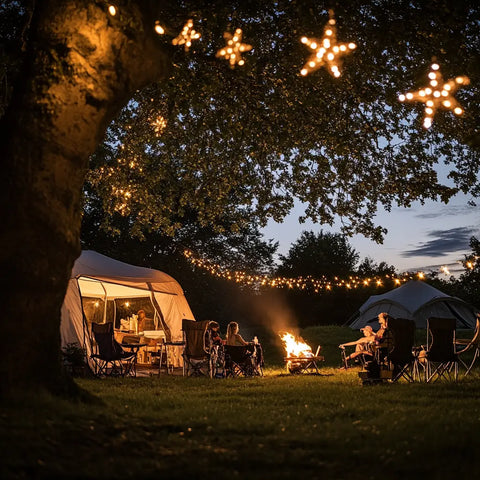
Factors To Consider When Choosing the Right Campsite
Choosing the right campsite is crucial for a successful and enjoyable camping trip. From finding a safe location to ensuring the terrain is comfortable, selecting the right spot can significantly impact your experience in the great outdoors.
Below are important factors to consider when picking the perfect spot for your adventure:
1. Location
The location of your campsite is essential to your comfort, safety, and overall experience. Picking a good spot can make your stay more enjoyable, while a poor choice can lead to discomfort or even safety issues.
Here are some key factors to consider when selecting a location for your campsite:
-
Proximity to Water: Being close to a water source is important for drinking, cooking, and cleaning. However, avoid setting up too close to rivers or lakes as they can flood, especially during heavy rains.
-
Safety from Wildlife: Always choose a location away from areas known for heavy wildlife activity. Bears, for example, may be attracted to food and trash, so select a site that is not in direct proximity to animal habitats.
-
Accessibility: Your campsite should be accessible but not too close to roads or popular tourist spots. A peaceful and secluded area is ideal, but ensure you can reach it easily and quickly if needed.
2. Terrain
The terrain you choose for your campsite affects your comfort and the ease of setting up your tent. Camping on uneven or sloped ground can make your stay uncomfortable and inconvenient, especially when it comes time to sleep.
Here are some key factors to consider when selecting the terrain for your campsite:
-
Flat Ground: Opt for a level, flat area to set up your tent. This minimizes the risk of discomfort and keeps you from rolling during the night.
-
Avoid Sloped Areas: Even a slight slope can cause problems, such as your sleeping bag shifting during the night or water running into your tent during rain. Always look for a flat, stable area to pitch your tent.
3. Legal Considerations
Before heading out, it's important to be aware of any legal restrictions that may apply to your chosen camping area. Following the rules ensures a safe and responsible camping experience while protecting the environment.
Here are some important legal factors to consider when choosing your campsite:
-
Permits: Many campgrounds and parks require permits for camping. Be sure to check whether your chosen location requires a permit and apply for one in advance if necessary.
-
Regulations: Different camping areas may have various regulations, such as fire bans, noise restrictions, and waste disposal rules. Make sure to familiarize yourself with these guidelines to avoid penalties and help preserve nature.
By focusing on location, terrain, and legal considerations, you can ensure a safe and comfortable campsite. Next, we’ll discuss Essential Gear for Night Camping to help prepare for a memorable outdoor adventure.
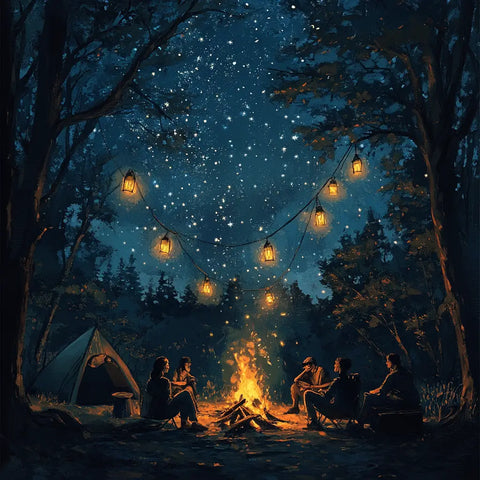
Essential Gears To Bring When Going for Night Camping
When preparing for a night of camping, having the right gear is essential to ensure a comfortable and safe experience. From staying warm and dry to navigating in the dark, the gear you bring can make all the difference in the quality of your camping trip.
Here are some essential items to bring for a successful night under the stars:
1. Tent
A good tent is one of the most important pieces of camping gear. It protects you from the elements and provides a safe place to sleep. Choosing the right type and features ensures comfort and reliability throughout your stay.
Here are some key factors to consider when selecting a tent for your night camping:
-
Tent Types: There are different types of tents, such as dome, tunnel, and cabin tents. Consider your group size, camping location, and season to choose the best one. Dome tents are lightweight and great for quick setups, while cabin tents offer more space for larger groups.
-
Weather Resistance: Look for tents designed for specific weather conditions, such as four-season tents for harsh winters or three-season tents for warmer climates. Make sure it can withstand rain and wind, especially if you’re camping in unpredictable weather.
-
Ventilation: Proper ventilation is essential to reduce condensation inside the tent. Choose a tent with mesh windows or vents that allow air to flow without letting rain in.
2. Sleeping Gear
Getting a good night’s sleep is crucial for staying energized and enjoying your camping adventure. The right sleeping gear ensures warmth, comfort, and a restful night under the stars.
Here are some key factors to consider when selecting sleeping gear for your camping trip:
-
Sleeping Bags: Choose a sleeping bag that suits the season and temperature range you’ll be camping in. Sleeping bags are rated by temperature, so ensure it’s appropriate for the conditions, whether it's a lightweight bag for summer or a thicker one for winter.
-
Sleeping Pads: Sleeping pads provide insulation and cushioning from the cold ground. An inflatable pad is compact and lightweight for easy packing, while foam pads are durable and provide excellent insulation.
-
Pillows: A small, portable pillow can add extra comfort, helping you sleep better after a long day of hiking or activities. Consider inflatable or compressible pillows for easy packing.
3. Lighting
Lighting is essential when camping at night. Whether you’re setting up your tent, cooking dinner, or exploring, having reliable light sources will keep you safe and comfortable after dark.
Here are some key lighting options to consider for your camping trip:
-
Lanterns: A camping lantern provides ambient light and is great for lighting up your entire campsite. Opt for a lantern that is rechargeable or battery-operated, and choose one with adjustable brightness.
-
Headlamps: A headlamp is hands-free and ideal for tasks like cooking or setting up your tent at night. Choose a headlamp with different brightness settings and long battery life.
-
Flashlights: A reliable flashlight is a must-have for navigating trails or walking to the restroom at night. Look for compact, durable models that can withstand the elements and provide ample illumination.
Additional Gears Worth Mentioning: Weather-Appropriate Gear
The temperature drops significantly at night. So it’s better to pack:
-
Insulated sleeping bags rated for nighttime temperatures
-
Thermal sleeping pad or air mattress
-
Layered clothing options including moisture-wicking base layers
-
Warm, waterproof outerwear
With the right gear in hand, you’ll be ready for a comfortable and safe night camping. Next, we’ll cover Safety Tips for Night Camping to ensure you stay secure during your outdoor adventure.
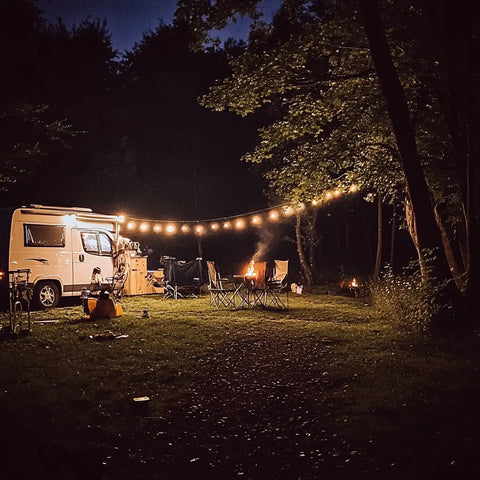
Safety Tips for Night Camping
Camping at night can be an incredible experience, but it’s important to stay vigilant and prepared for any potential risks. Following safety tips for handling wildlife, fire, and navigation ensures a safe and enjoyable camping experience under the stars.
Below are some key safety tips to keep in mind for a secure camping experience:
1. Wildlife Precautions
Wildlife encounters can be a concern when camping in nature, especially at night when many animals are more active. Taking precautions to secure your food and keep animals away from your campsite is essential for both your safety and theirs.
Here are some key tips for safely managing wildlife around your campsite:
-
Store Food Securely: Always store food in airtight containers or bear-proof canisters. If you’re in bear country, use a bear bag to hang food at least 10 feet off the ground and 4 feet from tree trunks. Never leave food in your tent or exposed around your campsite.
-
Avoid Attracting Animals: Make sure to clean up thoroughly after meals, including washing dishes and packing out any food scraps. Avoid using heavily scented toiletries, like lotions or toothpaste, that could attract animals.
-
Know the Local Wildlife: Familiarize yourself with the animals that may be in the area, such as bears, raccoons, or coyotes. Learn the proper ways to handle encounters, such as staying calm and making noise to deter animals.
2. Fire Safety
Building a campfire is a classic part of the camping experience, but it must be done responsibly to prevent accidents or wildfires. Understanding how to safely build, maintain, and extinguish a campfire is crucial for a safe night outdoors.
Here are some essential fire safety tips for camping:
-
Build a Safe Campfire: Choose a fire pit that is located far from tents, trees, and other flammable materials. Use a small, controlled fire to prevent spreading, and always keep the fire manageable.
-
Maintain the Fire: Never leave a campfire unattended. Always have a bucket of water or a fire extinguisher nearby in case you need to control the fire quickly.
-
Extinguish the Fire: Before going to sleep or leaving your campsite, make sure your fire is completely out. Pour water over it, stir the ashes, and ensure there are no embers still burning. Never leave a campfire smoldering.
3. Navigation
Navigating in the dark can be tricky, especially when you're hiking or exploring off the beaten path. Using proper navigation tools and techniques is vital to ensure you don’t get lost or disoriented after the sun goes down.
Here are some key navigation tips for camping at night:
-
Use Maps and Compasses: Always carry a map of the area and a compass, even if you’re familiar with the campsite. Learn basic map-reading and compass skills so you can orient yourself if needed.
-
Plan Your Route: Before heading out, plan your route carefully and inform others of your whereabouts. Stick to established trails, and avoid straying too far from your campsite in the dark.
-
Nighttime Technology: If you’re in an area with service, a GPS device or smartphone app can help with navigation. However, always have a backup in case of battery failure.
With these safety tips in mind, you can feel confident and secure during your nighttime camping adventure. Next, we’ll explore Activities to Enhance Your Experience for an unforgettable time in the outdoors.
Activities to Enhance Your Experience
Night camping offers the unique opportunity to immerse yourself in nature's wonders, whether it’s gazing at the stars, exploring trails under the moonlight, or sharing stories by the campfire. These activities will enhance your camping experience and create lasting memories.
Here are some exciting activities to elevate your camping experience:
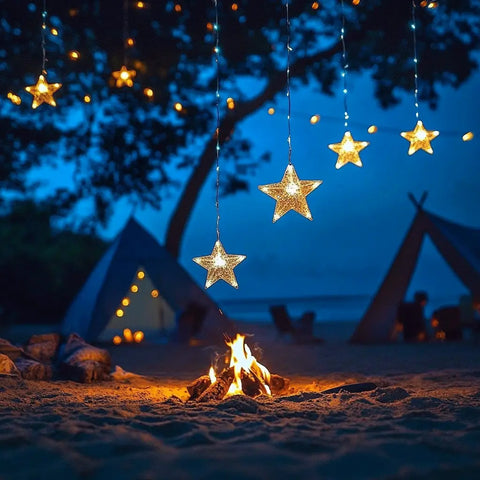
1. Stargazing
One of the most magical aspects of camping at night is the opportunity to stargaze. Away from city lights, the night sky reveals a stunning array of celestial events and constellations. With a little preparation, you can make the most of your stargazing experience.
Here are some best practices for observing celestial events:
-
Choose a Dark Location: Make sure your campsite is in a remote area with minimal light pollution. Look for a spot away from city lights, street lamps, or campgrounds with bright lights.
-
Bring a Stargazing App: Use a stargazing app to identify stars, planets, and constellations. These apps provide real-time maps of the night sky and help you track celestial events like meteor showers or eclipses.
-
Watch for Meteor Showers: Time your camping trip to coincide with meteor showers for an unforgettable experience. August (Perseid) and December (Geminid) are prime months for meteor activity.
-
Binoculars or Telescopes: While the naked eye can reveal many celestial objects, bringing binoculars or a portable telescope can offer more detailed views of the moon, planets, and distant stars.
2. Night Hikes
A night hike can be an exhilarating way to experience the outdoors in a new light—literally. With the right precautions, a nighttime hike offers a unique way to connect with nature and explore your campsite area under the stars.
Here are some safety tips and recommended trails for night hiking:
-
Safety First: Always hike with a buddy and ensure you carry a flashlight or headlamp with extra batteries. Wear sturdy footwear, and use a walking stick if needed for stability.
-
Know the Trail: Stick to well-marked, easy-to-follow trails. Avoid unfamiliar or challenging terrain after dark. Trails with reflective markers are ideal for night hikes.
-
Stay Close to the Campsite: If you're new to night hiking, it's best to stay close to your campsite. Some campgrounds offer guided night hikes where you can learn about nocturnal wildlife and natural features of the area.
-
Embrace the Quiet: Night hikes are an excellent opportunity to experience the solitude of nature. Be mindful of the sounds around you, and look for nocturnal wildlife like owls or bats.
3. Campfire Stories
Campfire stories have been a camping tradition for generations, providing entertainment, bonding, and a sense of adventure. Sharing tales around the fire can turn a simple evening into a memorable one for everyone involved.
Here are some ideas for engaging storytelling around the campfire:
-
Ghost Stories: A classic choice, ghost stories are always a hit around the campfire. Make the tale more engaging by setting the scene and using dramatic pauses to heighten suspense.
-
Personal Adventure Stories: Share your own memorable outdoor adventures or funny camping mishaps. Personal stories can be entertaining and relatable for your audience.
-
Myths and Legends: Research local folklore or legends from the area where you’re camping. Telling stories tied to the region adds a special, cultural element to the experience.
-
Interactive Stories: Turn the storytelling into a group activity. You can start a story, and each person around the campfire adds a line or a twist, making it an ongoing, collaborative tale.
With these activities, your night camping will be filled with excitement, wonder, and shared experiences. Next, we’ll dive into Cooking Under the Stars to help you prepare delicious meals outdoors.
Cooking Under the Stars
One of the best parts of camping is preparing and enjoying meals outdoors, surrounded by nature. Cooking under the stars is not only practical but also a fun way to bond with friends and family. With the right meal prep, cooking gear, and food storage methods, you can enjoy delicious meals that enhance your outdoor experience.
Here are some tips and activities to keep in mind when cooking under the stars:
1. Meal Prep
When camping, preparing simple and easy-to-make meals is essential. Opting for recipes that are quick to prepare, require minimal ingredients, and are versatile for outdoor cooking ensures a smooth and enjoyable dining experience.
Here are some easy meal ideas suitable for camping:
-
Foil Pack Meals: Foil packs are great for cooking over an open flame or campfire. Simply wrap your favorite ingredients (like chicken, potatoes, and vegetables) in foil and place them on the grill or over hot coals for a quick, no-mess meal.
-
One-Pot Meals: A one-pot meal like chili, stew, or pasta is a fantastic option for camping. You can prepare all your ingredients in one pot, minimizing cleanup while still enjoying a hearty meal.
-
Grilled Skewers: Skewers are perfect for grilling over a campfire. Prepare marinated meat, veggies, or even fruit ahead of time, and cook them over the flames for a delicious and easy meal.
-
Pre-Packaged Meals: For convenience, bring along freeze-dried meals that only require boiling water to prepare. These are especially handy for solo campers or those on shorter trips.
2. Cooking Gear
When cooking in the great outdoors, having the right cooking gear is essential to make meal preparation and cleanup as efficient as possible. Choose lightweight, compact tools that can withstand outdoor conditions and be easily packed.
Here are some essential tools for outdoor cooking:
-
Portable Stove: A lightweight camp stove is a must-have for boiling water, cooking meals, and boiling pasta or soup. There are many options available, from small single-burner stoves to larger two-burner models.
-
Cooking Utensils: Bring basic cooking utensils like a spatula, tongs, and a stirring spoon. A multi-tool with a knife, can opener, and bottle opener can also be handy.
-
Cookware: Non-stick pans and lightweight pots are ideal for camping, as they’re easy to clean and pack. Consider a set of collapsible pots or compact cookware that fits neatly in your bag.
-
Grill or Grate: If you're cooking over an open flame, a small, portable grill grate or campfire grill can help you cook food directly over the coals. Make sure it’s sturdy and easy to clean.
-
Cooler or Ice Packs: To store your perishable food and keep it fresh, bring a good-quality cooler with ice packs. This will help keep your meat, dairy, and other perishables safe during your trip.
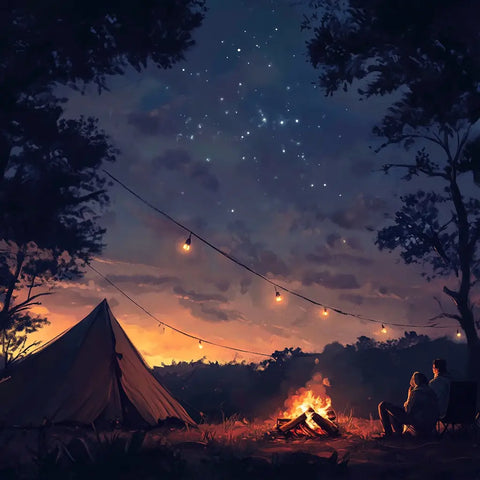
3. Food Storage
Proper food storage is crucial when camping to ensure food stays fresh and safe to eat, especially if you’re camping overnight or in warmer weather. Effective storage will prevent spoilage and keep animals from rummaging through your food.
Here are some tips for keeping perishables safe overnight:
-
Cooler Management: Store perishables like meat, cheese, and dairy in a well-insulated cooler. Keep the cooler in a shaded spot and use ice packs or blocks of ice to maintain a low temperature throughout your trip.
-
Dry Goods: Keep dry foods like grains, nuts, and snacks in airtight containers to prevent moisture from getting in. Ziplock bags or reusable containers are ideal for packing small amounts of items.
-
Bear-Proof Storage: If camping in bear country, store food in a bear-proof canister or hang food high in a tree to keep animals away. This is especially important for items with strong smells, like peanut butter or meats.
-
Pre-Packaged and Non-Perishables: Opt for pre-packaged or non-perishable items when possible. Canned foods, pasta, and granola bars are great staples that don’t require refrigeration and can be easily packed.
How To Feel And Embrace the Night Atmosphere
One of the most captivating aspects of camping at night is the atmosphere. The quiet, the cool air, and the solitude of nature create a sense of peace and connection. By setting up your campsite thoughtfully, tuning into the natural sounds, and engaging in mindfulness activities, you can fully embrace the night’s ambiance for a truly unforgettable experience.
Here are some ways to feel and embrace further the night atmosphere during your camping experience:
1. Tips To Consider When Setting Up the Camp
Creating a cozy and inviting environment at your campsite can help you feel at home and comfortable as the night sets in. Simple touches of decor and thoughtful organization can transform your campsite into a relaxing retreat.
Here are a few ideas for making your campsite feel cozier:
-
Use Outdoor Lighting: Hang string lights or lanterns around your campsite to create a soft, warm glow. These lights will provide visibility without being too harsh, adding a peaceful ambiance to your surroundings.
-
Comfortable Seating: Bring along foldable chairs, blankets, and pillows to create a comfortable seating area by the fire or under the stars. Consider bringing a hammock for the ultimate relaxation spot.
-
Personal Touches: Add items like a colorful rug, lanterns, or a few decorative elements to personalize your space. Simple touches, like an outdoor rug or cozy throws, can help make the setting feel more inviting.
-
Campfire Setup: A well-arranged campfire setup can be both functional and atmospheric. Arrange rocks around the fire pit for a sturdy and secure setup, and be sure to have a few logs ready for additional warmth and comfort.
2. Nighttime Sounds
Nature’s nighttime sounds can have a calming and grounding effect, making the experience of camping under the stars truly magical. Take the time to immerse yourself in the symphony of sounds around you.
Here’s how you can appreciate nature’s night sounds:
-
Listen to the Wind: The sound of the wind rustling through the trees or across open spaces can create a soothing background to your night. Try to identify different wind sounds as they shift direction or strength.
-
Animal Sounds: Listen for the calls of owls, the chirps of crickets, or the rustling of small mammals in the brush. These sounds are unique to the night environment and can deepen your connection to the wilderness.
-
Water Flow: If you’re near a river, stream, or lake, the sound of water flowing can add a peaceful, calming quality to your evening. Close your eyes for a moment and allow the gentle sounds to wash over you.
-
Nocturnal Creatures: Pay attention to the night-time creatures such as frogs, bats, and other animals that are more active after dark. These sounds can create a rhythmic, peaceful environment.
3. Mindfulness Activities
Embracing the night atmosphere also means taking time for mindfulness activities that connect you with the present moment. Whether through meditation or journaling, these activities can deepen your experience under the stars.
Here are some mindfulness activities to try during your night camping trip:
-
Meditation: Find a quiet spot, sit comfortably, and focus on your breath. Let go of distractions and focus on the sights, sounds, and smells of nature around you. Meditation can enhance relaxation and help clear your mind, allowing you to feel fully immersed in the moment.
-
Journaling: Writing in a journal is a great way to reflect on your day and capture your thoughts. Take a few minutes to document your experience, write down your feelings, or note any interesting wildlife or events. Journaling can also help you reflect on the serenity and beauty of nature.
-
Stargazing Reflection: While gazing at the stars, take a moment to reflect on the vastness of the universe. This simple practice can help shift your perspective, allowing you to feel a sense of wonder and gratitude for the natural world.
-
Mindful Breathing: Use breathing techniques to center yourself. Take deep breaths, in and out, slowly and intentionally, and pay attention to how each breath feels. This practice can calm the mind and enhance your connection to the environment.
By setting up a cozy campsite, appreciating the nighttime sounds, and practicing mindfulness, you can fully embrace the peaceful atmosphere of a night outdoors.
Campfire Entertainment
The campfire is the perfect place to unwind, connect, and create unforgettable memories. Whether you’re telling stories, singing songs, or capturing the beauty of the night, these simple activities will enhance your camping experience.
1. Fun Activities Around the Fire
-
Traditional Storytelling: Share spooky tales, personal adventures, or creative stories with your group under the stars.
-
Group Singing: Bring along an instrument and have a sing-along with classic campfire songs.
-
Campfire Cooking Challenges: Turn cooking into a fun competition by creating tasty meals over the fire.
2. Night Photography Tips
-
Long-Exposure Shots: Capture the movement of stars and celestial events with long-exposure photography.
-
Light Painting: Use flashlights or sparklers to create stunning visuals in the dark.
-
Campfire Silhouettes: Take silhouette photos of people around the fire for dramatic shots.
3. Group Fun Activities
-
Night Hikes: Explore the outdoors after dark with proper safety measures.
-
Glow-in-the-Dark Games: Play classic games like hide and seek or charades with a fun nighttime twist.
-
Trivia and Skill Sharing: Test your outdoor knowledge with trivia or teach each other useful camping skills.
These activities will make your campfire nights a memorable and fun experience for everyone involved!
Where to Buy the Best Camping Gear for Your Outdoor Adventures in 2025
Ready to elevate your camping experience with top-quality gear? At Camp Supreme, we offer an extensive selection of essential and innovative products designed to enhance your outdoor adventures, from durable tents to comfortable camping furniture and everything in between.
Here’s why Camp Supreme is your premier destination for camping gear:
-
Quality Assurance: Our products are meticulously selected to meet the highest standards of safety and durability, ensuring you have reliable gear that stands up to the elements and lasts for years to come.
-
Wide Selection: We provide a diverse range of categories including Camping Furniture, Tents, Cooking & Food Supplies, Car Tents, Clothing & Footwear, Backpacking Essentials, Navigational & Survival Accessories, Outdoor Tools & Safety Gear, Sleeping Bags, and Water Gear. Whatever you need for your next adventure, we have you covered.
-
Competitive Pricing: Enjoy exceptional value with our affordable prices, making it easy to gear up for your camping trips without stretching your budget.
-
Customer Satisfaction: Our dedicated team is committed to providing outstanding customer service, helping you choose the perfect products for your outdoor needs and offering guidance when needed.
Therefore, we invite you to explore our range of camping gear today. Click below to visit our store and discover the perfect items for your next outdoor adventure!
Final thoughts
Night camping offers a unique opportunity to connect with nature and create lasting memories under the stars. By carefully selecting your campsite, ensuring you have the essential gear, and following safety precautions, you can enhance your overall experience.
Additionally, engaging in activities such as stargazing, night hikes, and sharing campfire stories adds depth to your adventure, making it truly unforgettable.
Moreover, cooking meals outdoors allows you to enjoy delicious food while bonding with friends and family. With the right preparation and mindset, your night camping experience can become a cherished highlight of your outdoor adventures.
With the help of these tips and activity suggestions, we wish you to embrace the magic of the night and enjoy every moment spent in the great outdoors to the fullest.
Share
Rewrite
Key Takeaways
-
Choose a location that is safe, accessible, and away from wildlife, ensuring a comfortable camping experience.
-
Opt for flat ground to set up your tent, avoiding slopes that can lead to discomfort during the night.
-
Bring a reliable tent, appropriate sleeping gear, and adequate lighting to ensure safety and comfort during your night camping adventure.
-
Store food securely in bear-proof containers and keep your campsite clean to prevent attracting animals.
-
Build and maintain campfires responsibly, keeping them manageable and ensuring they are completely extinguished before sleeping.
-
Carry a map and compass for navigation at night, and plan your route to avoid getting lost in the dark.
-
Take advantage of the clear night sky by stargazing; use apps to identify constellations and time your trip for meteor showers.
-
Experience the outdoors uniquely by going on night hikes with proper gear and sticking to well-marked trails.
-
Enhance your camping experience by sharing ghost stories, personal adventures, or local folklore around the campfire.
-
Prepare easy-to-make meals like foil pack dinners or one-pot meals to enjoy delicious food while bonding with fellow campers under the stars.
FAQs
What is the most important safety equipment for night camping?
Multiple light sources (headlamp, flashlight, and lantern) with backup batteries are essential for safe night camping.
How can I protect my food from wildlife at night?
Use bear-proof containers or hang food bags at least 10 feet high and 4 feet from the tree trunk, away from your sleeping area.
What's the best way to prepare for temperature changes while night camping?
Pack layers of clothing and a sleeping bag rated for temperatures lower than expected, as nighttime temperatures can drop significantly.
How can I make the most of stargazing while camping?
Choose a clear night, find an open area away from artificial light, and use stargazing apps or guides to identify celestial objects.
What are some must-have items for night camping?
Essential items include multiple light sources, warm sleeping gear, appropriate clothing layers, navigation tools, and a well-stocked first aid kit.
